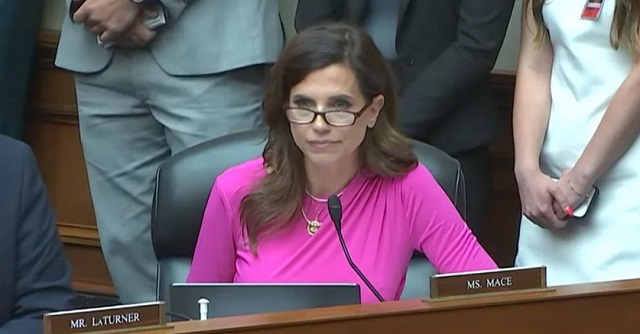U.S. Rep. Nancy Mace, R-South Carolina
U.S. House Oversight Committee via YouTube
By Bethany Blankley
Two articles of impeachment were filed against U.S. Secret Service Director Kimberly Cheatle just before she resigned Tuesday over security failures at the Pennsylvania campaign event where former President Donald Trump was shot.
A Florida congresswoman asked for criminal charges to be brought against her, and two Republicans, Greg Steube, R-Florida, and Nancy Mace, R-South Carolina, took actions for her to be impeached.
After she resigned, U.S. Rep. Marjorie Taylor Greene, R-Georgia, said Cheatle “will not get to slither away and enjoy retirement.” She still needed to be investigated for her “role in the attempted assassination of former President Donald Trump. There may be criminal charges coming in the future. I think she showed up to the Oversight Committee, refused to answer our questions, did not bring any of the information that we asked her to bring in subpoenaed, she came in and participated in a full cover up and then resigned … that speaks a message loud and clear.”
If Cheatle hadn’t resigned, she might have been the second cabinet member to be impeached by the House after her boss, Department of Homeland Security Secretary Alejandro Mayorkas. Mayorkas was impeached on two counts in February for his role in creating the border crisis. Multiple Congress members and others have called for Mayorkas to resign following the July 13 assassination attempt of former President Donald Trump.
Greene also said Cheatle and Mayorkas “will face accountability for actions, including possible criminal investigations.”
Although Cheatle was an appointed officer, impeachment could still be possible. One presidential cabinet member was impeached after resigning, Secretary of War William Belknap, over corruption charges in 1876. The Senate said he was eligible to be impeached and tried even though he resigned, according to the Congressional Research Service. He was later acquitted.
“The Secret Service calls themselves ‘one of the most elite law enforcement agencies in the world,’” Steube said. “What happened under their watch in Butler, Pennsylvania, was an international embarrassment and an inexcusable tragedy.”
On Monday, he filed one article of impeachment against Cheatle “for her dereliction of duty as it relates to the assassination attempt on President Trump’s life.”
The article states Cheatle “has negligently failed to uphold the agency’s mission and statutory charge to ‘ensure the safety and security’ of ‘protectees, key locations, and events of national significance.’”
It describes a range of security failures and conflicting statements Cheatle made to media outlets. It also addresses her action to shift the focus of the Secret Service from “solely providing the best protection services possible for protectees to meet arbitrarily set diversity hiring quotas.”
“Through these actions,” the article states, Cheatle “demonstrated a neglect for her duty to lead the Secret Service in a manner that provides effective protection to protectees, including President Donald Trump,” and her “conduct, warrants impeachment and trial, and removal from office and disqualification to hold and enjoy any office of honor, trust, or profit under the United States.”
Mace also filed a privileged motion, requiring the House to vote on impeaching Cheatle within 48 hours. By the time she resigned, she had 24 hours left.
“This is an unprecedented resolution – never in American history has the House voted to impeach what is called an ‘inferior officer,’ or an appointed member of the administration who is not subject to Senate confirmation,” Mace said in a statement.
Cheatle’s “gross dereliction of duty since July 13th led to an unprecedented security breach and a preventable tragedy,” Mace said after an “absolutely egregious” performance at Monday’s Congressional hearing, where Cheatle testified. “She failed to provide us with answers. She failed to tell us a timeline. She failed in every way imaginable. As a result, her failure not only cost the life of someone, but also undermined the trust and confidence placed in the Secret Service by the American people. After today’s hearing – with the extreme lack of transparency and accountability, this impeachment resolution is a necessary step to hold her accountable for her actions.”
After several hours of committee members expressing frustration over Cheatle not answering questions, Chairman Rep. James Comer, R-Kentucky, told her, “You answered more questions with an ABC News reporter than you have with members of Congress. You’re here with a subpoena and we expect you to answer the questions.”
Mace then hammered Cheatle with a series of yes or no questions. She first gave Cheatle the opportunity to use her five minutes to draft her resignation letter; Cheatle declined.
She asked if the Secret Service had “been transparent with this committee?” to which Cheatle replied, “yes.” Mace then asked if “the fact that we had to issue a subpoena to get you to show up today” was transparent and Cheatle attempted to answer but Mace cut her off saying, “no, we had to issue a subpoena to get you to show up today.”
In response to Cheatle stating earlier that the Secret Service wasn’t political, Mace asked her how her opening statement was leaked to three media outlets several hours before the hearing. Cheatle said, “I have no idea how my statement got out.” Mace replied, “well that’s bull****.”
She also asked Cheatle if the Secret Service was fully cooperating with the committee; Cheatle replied, “yes.” Mace said the committee sent her a list of demands for information on July 15 and still hadn’t received answers. Each time Mace asked a question, Cheatle replied, “I’ll have to get back to you on that,” to which Mace replied, “that is a no.”
“You’re just being completely dishonest,” Mace said. “You are being dishonest or lying. These are important questions that the American people want answers to and you’re just dodging … we had to subpoena you to be here and you won’t even answer the questions. We’ve asked you repeatedly to answer our questions. These are not hard questions.”




















